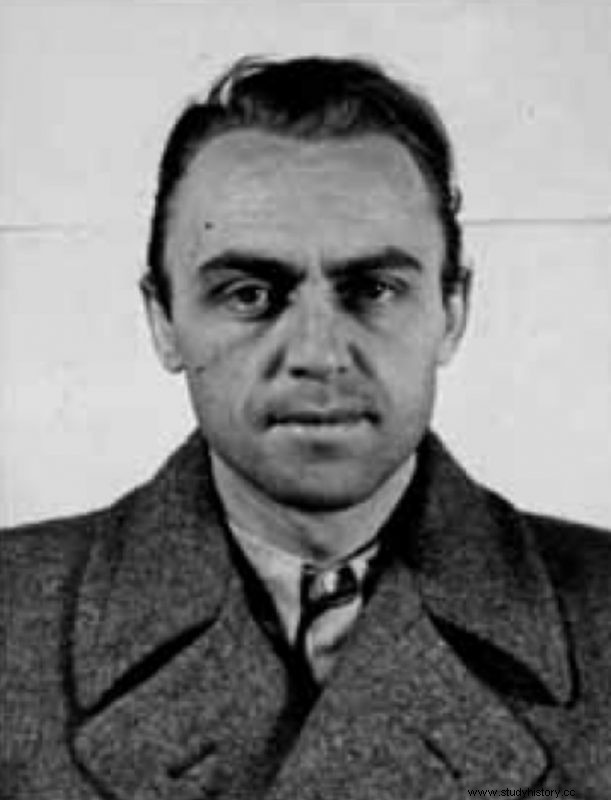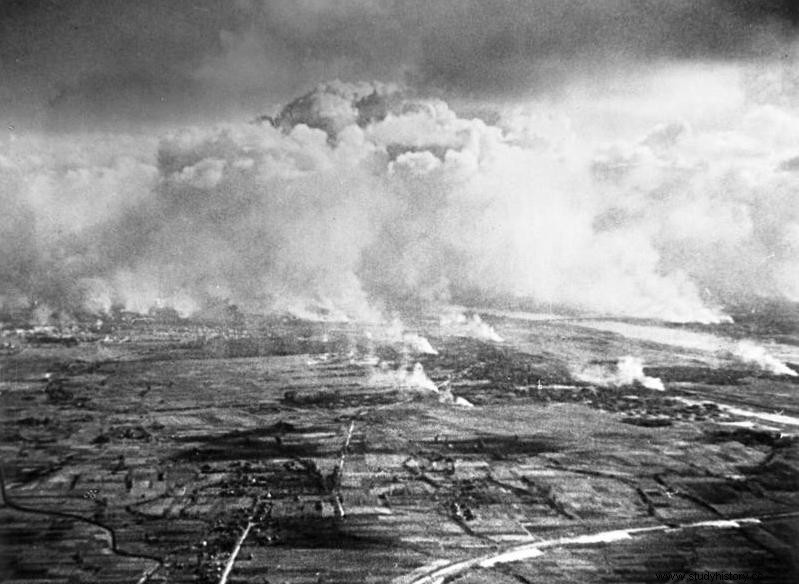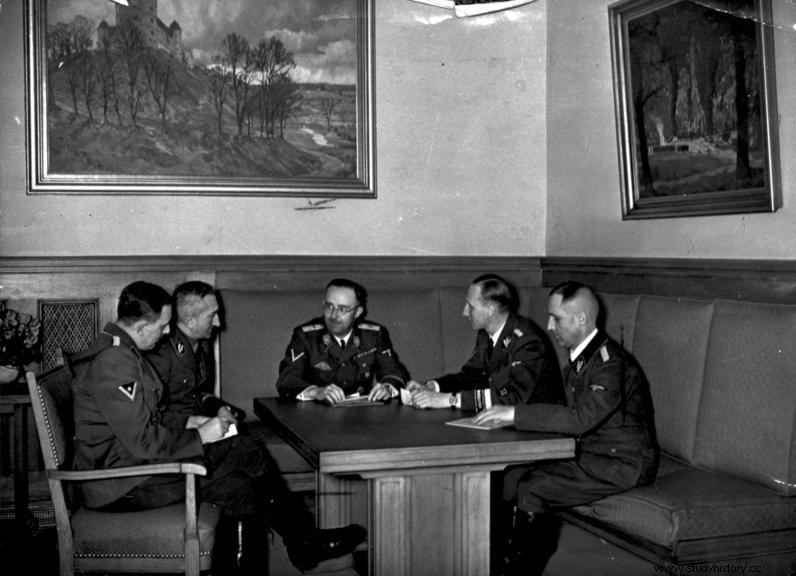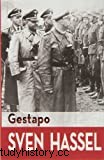From its birth, in six years the Gestapo had gone from a regional secret police to a crucial element in the rise and spread of Nazi Germany. Under the command of its enigmatic director, Heinrich Müller, it had become an instrument of terror whose success in crushing the resistance was unmatched. In 1939 few dared to oppose Hitler or the Reich. That was Hitler's goal. He was already ready to move forward, unhindered by opposition, one step further in his master plan. The Gestapo was to gradually move into another role and onto a new, international stage.
The Tannenberg operation
Night of August 31, 1939, on the eastern border of Germany. A handful of trucks go on a secret mission. It's about the Tannenberg operation. With secret orders from the head of security, Reinhard Heydrich and his assistant, the head of the Gestapo Heinrich Müller. Tension had been building on the border between Germany and Poland. The German press had reported that there had been many Polish provocations, all of them unfounded.
Alfred Naujocks was a security agent in the service of the Gestapo and would later cheerfully describe the role he played that night. By his own account, Naujocks had been ordered to move with several SD men to the Polish border in East Prussian province. There he had to wait for Heydrich's password grandma is dead . When the password arrived, Naujocks and his men sprang into action.

Heydrich said:in order to carry out this attack inform Müller of the preserves . The canned it was the fresh-corpse password. Then Naujocks and his men rushed into the local radio station on the German side of the border, pretending to be Polish soldiers. They fired a few shots and a Polish commentator warned the local population to rise up against the Nazis.
The fake Poles disappeared, leaving the corpse there, except it wasn't dead. The man was a German who had been arrested for sympathizing with the Poles. He died where Naujocks had left him and would be used as evidence of Polish aggression.
In other areas of the border, Müller's Gestapo had plans for other preserves . Mock attacks were staged at other points along the border, where convicted criminals would be dressed as Polish soldiers. These would be killed and left in certain places to simulate that they had died in combat after attacking German positions. After the alleged assaults they were going to take members of the press and other people to the scene of the incidents. In addition, he had already prepared a police report.
The Gestapo's plans had worked. In a few hours, Hitler denounced a total of 21 alleged Polish incursions along the border. On September 1 war was declared.
The occupation of Poland
With the invasion, Hitler not only thought of military occupation, but also of cleaning up the occupied societies for a future German colonization of those territories. To this end, the police should play a leading role in the adaptation of the occupied countries. In the first weeks of the war, more than 130,000 police officers were sent to Poland for this purpose. The Gestapo would be the supreme police force that would direct this enormous oppressive force.
The job of the police was to start as soon as possible. The police were waiting along with the army at the border. As German forces streamed over the border, the Gestapo organized special police squads and SS security to complete the first task:liquidating the entire Polish government. From there they took to the streets and the local police arrived to help them.
The usual identity checks became an instrument of political oppression. Anyone who did not fit the profile approved by the Gestapo was arrested on the spot. Political protesters, called parasites, the intelligentsia, and above all they focused on the Jews. In the German press, the role of the police was minimized. Abroad the truth was harsher.

The characteristic mark of the Gestapo was unmistakable. His strategy was to encourage Poles to indulge a pent-up inclination toward anti-Semitism by denouncing and attacking their own countrymen. In fact, they did the work of the Gestapo. Those arrested were deported to concentration camps. The combined power of the Wehrmacht and the Gestapo was overwhelming. Within weeks, Warsaw had fallen.
The control of the occupied territories and the persecution of the Jews
The Gestapo had proven its effectiveness. Since then it would be the key to German control over the occupied territories. The touchstone of your expansion. But the Gestapo, for all its success, was still quite small and its intelligence, though extensive, was quite outdated. When the Gestapo failed, it did so in spectacular fashion, as a single attack on Hitler would show.
On November 8, 1939, Hitler suffered an attack on the Bürgerbräukeller brewery in Munich. One man, Georg Elser, had managed to bypass all the Gestapo security.
Thanks to the quick resolution of the attack, the fame of the Gestapo was quickly restored. Although what was clear is that Himmler, Heydrich and Müller had become indispensable. Together they had the German security net in an iron fist and without their skills Hitler's plans would have been in jeopardy. Because as the Reich expanded across Europe, so did the Gestapo, playing a major role not only in suppressing opposition, but in implementing Hitler's dream:the elimination of the Jews.

The plan ran smoothly throughout Nazi Germany. SS officer Kurt Lischka, who had been very successful dealing with Jewish issues in the Gestapo in Berlin, had continued his duties in Cologne. He quickly filled the cells with suspected opposition fighters and began working on a plan to deport all of the city's Jews, some 12,000 people in all.
But before he could complete his work, he was assigned a new position. After proving himself effective, he was shortlisted for a combat administrator position. They were the heads of the Gestapo in the occupied countries. His job was to bring tried and tested Gestapo methods to suppress resistance abroad. Lischka was given Paris.
He quickly installed himself in the splendid offices of the Ruede Saussaies, an infamous name in Parisian history. Just as he did in Cologne, he turned the Gestapo into an organization of fear. There were fewer willing snitches there than at home, so Lischka faced quite a challenge. In France, there was a growing and well-organized resistance. His attacks were carefully chosen and his successes, along with his propaganda, kept French pride alive and the Gestapo busy.
Despite Lischka's attempts to keep morale high, Paris was not an easy destination. Some of Lischk's problems came from fellow Germans who opposed the government and had gone abroad to try to do something about it. In Paris, Kurt Lischka had received a new assignment, he had to start the deportations of all the Jews from France and that is where he believed that he could really prove his worth.
rebates The Gestapo:Myth and Reality of Hitler's Secret Police (Critical Memory) McDonough, Frank (Author) 21 €.75
The Gestapo:Myth and Reality of Hitler's Secret Police (Critical Memory) McDonough, Frank (Author) 21 €.75  Gestapo Hassel, Sven (Author) 9.95 EUR
Gestapo Hassel, Sven (Author) 9.95 EUR When Paris was finally liberated in 1944, the Gestapo had no time to destroy the records. The mountains of documents they left behind are testimony to Lischka's diligence. Among them were the documents with his signature ordering the deportation of French Jews for physical extermination as soon as possible in the East.
As a first step, all stateless Jews who had fled to France from Germany were to be arrested. There were not enough Gestapo agents to do it, so a good solution was to entrust the task to the collaborationist French police. According to the data thrown by the documents found, 90% of the Jews arrested in France were detained by the French police, under orders of the occupying Germans. In total 80,000 people were deported from France to Auschwitz by order of the Gestapo.
Last updated on 06-09-2022 / Affiliate Links / Affiliate API Images
